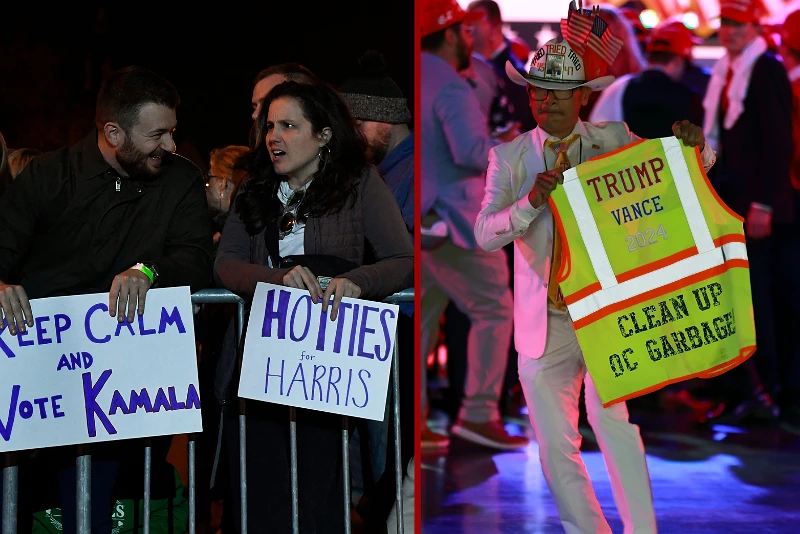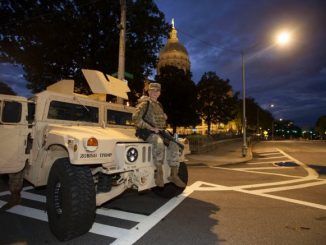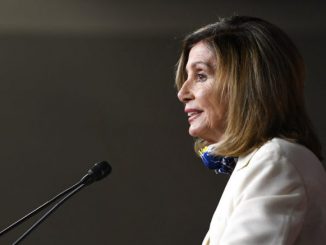

OAN Staff Brooke Mallory
7:27 PM – Tuesday, November 5, 2024
After polls close nationwide on Tuesday night, waves of election results will start to roll in, but it could take more time to determine the winner in several crucial states, and much longer to receive official, certified results.
Advertisement
The emergence of mail-in voting, which was chosen by almost one-third of voters nationwide in the 2022 midterm elections, is one of several factors contributing to the longer ballot count times in some states, according to the MIT Election Lab.
While some states permit the counting of mail-in ballots prior to Election Day, others do not let poll workers begin the process until after in-person voting has concluded.
The laws governing official ballot counts and certification in various states are broken down here.
In Arizona, polls close at 7 p.m. local time (9 p.m. ET).
About 80% of voters in Arizona typically cast their ballots by mail, officials say.
This practice has been permitted for more than 20 years. Election officials in the state can start processing and tallying ballots as soon as they get them, but the results might not be made public until all precincts have reported them or an hour after polls close on election day, whichever comes first. In Arizona, it is a felony to release information early.
“The polls are really close in Arizona, and Maricopa [County] is expecting 10 to 13 days to count all votes,” said University of Arizona professor Christopher Weber. “I – like others – anticipate delays. Though we may have predictions beforehand, it’s really difficult to say. I don’t remember a time in which polling was so close.”
According to the state elections website, county elections officials are in charge of counting ballots in county, state, and federal elections.
Once early voting has started, counties can start tallying votes once early and provisional ballots have been verified by a county recorder’s office. While ballots received on election day will be processed in the days immediately after, the majority of early ballots will be counted prior to election day.
If the difference between two candidates’ votes is 0.5 percentage points or less, an automatic recount is initiated.
Georgia polls close at 7 p.m. ET.
Following the 2020 election, when over 1.3 million Georgians exercised their right to vote by absentee ballot, the state’s absentee ballot voting rate fell precipitously.
That number fell below 300,000 during the 2022 midterm elections, a number that supporters attributed to a contentious 2021 law that restricted access to ballot drop boxes, tightened regulations on mailed ballots, and instituted additional regulations such as prohibiting non-poll workers from distributing food and beverages to voters waiting in line.
A requirement that the total number of ballots be counted by hand following machine tallying was adopted by Georgia’s State Election Board in September. Judges in Georgia, however, invalidated that and other newly established restrictions because they claimed it was too close to election day.
“In general, I want to prepare people for the possibility that it may take a couple of days to count, and just because it may take a couple of days, that doesn’t mean people are manipulating the system,” Emory University professor Andra Gillespie said.
Georgia law states that the votes be certified “no later than 5:00 P.M. on the Monday following” the election. However, since this year that Monday falls on November 11th, which is Veterans Day, that deadline was moved to the following day, November 12th.
Both candidates have until Thursday, November 14th, to request a recount. When the results fall within 0.5% of the total votes cast for the position, a losing candidate in Georgia may request a recount.
In Michigan, the last polls close at 9:00 p.m. ET. Although some western counties are on central time, polling stations in most parts of the state are in the eastern time zone and close at 8 p.m.
According to David Dulio, a professor at Oakland University, it might be challenging to forecast when the state’s winner will be known because “elections in Michigan are very decentralized.”
“Our elections are run by 1,600 different local clerks who all have to do all of that work and then send it up the chain. That has the potential to slow things down,” Dulio stated.
After the election, county boards of canvassers have up to 14 days to finish their official counts before submitting them to a state board. A winner must be announced by November 25th by the Secretary of the Board of State Canvassers.
If the contest is close, meaning that the two candidates are separated by fewer than 25,000 votes, Michigan law requires the state board to accelerate its canvass “as soon as practicable.”
An automatic recount is initiated if the candidates are within 2,000 votes, although it must to be complete within 30 days of the election.
Nevada polls close at 7 p.m. PT (10 p.m. ET).
Nevada is one of eight states that have implemented all-mail elections since 2022. In these elections, each voter receives a ballot via mail along with pre-paid postage, however, in-person voting at polling places is also permitted.
Ten days following the election, on November 15th, the state’s board of county commissioners must finish canvassing at the county level.
It shouldn’t take “very long” to find out the winner, according to Sondra Cosgrove, a professor at the College of Southern Nevada who oversees the nonprofit organization Vote Nevada.
“We are assuming we will know by November 9,” Cosgrove said.
By November 18th, either candidate may request a recount, which must start within a day and be finished within five days, no later than November 24th. This is because the secretary of state must meet with the justices of the Nevada Supreme Court on November 26th, the fourth Tuesday of the month, in order to conduct a state-wide canvass. The election is then certified by the governor.
At 7:30 p.m. ET, North Carolina polls close.
North Carolina officials say that the devastation caused by Hurricane Helene this year may affect both turnouts and ballot processing overall. In late September, the hurricane devastated large areas of the state’s western half, forcing residents to relocate while destroying infrastructure, including polling stations.
On October 7th, the North Carolina State Board of Elections authorized emergency measures aimed at enhancing voting accessibility for citizens of the storm-affected 13 counties.
According to North Carolina state law, county election boards must convene on November 15th at 11 a.m. in order to complete their canvases. The State Board of Elections must convene on Tuesday, November 26th, three weeks following the election. Six days later, that body must certify the election if there are no objections to the results.
If there is a less than a 0.5 percent difference between the two candidates and one of them formally demands a new count of the votes, a required recount is initiated. Two days following the county-level canvass, on November 17th, at noon, that request must be submitted.
Pennsylvania polls shut at 8 p.m. ET.
According to Pennsylvania law, counties are not allowed to start counting absentee and mail-in ballots until seven in the morning on election day. On the third day following the election, which is November 8th this year, full returns are processed starting at 9 a.m.
In August of this year, the Supreme Court of Pennsylvania issued an order accelerating cases pertaining to elections. The order reduced from ten to three days the time frame for appealing a lower court decision.
If the unofficial election returns, which are due on November 12th, reveal that the candidates are separated by less than 0.5%, the state will automatically initiate a recount and recanvass. The deadline for finishing the recount would be November 26th.
In Wisconsin, polls close at 8 p.m. CT (9 p.m. ET).
By 4 p.m. on the day following the election, or by 4 p.m. the following day if the municipality employs a municipal board of absentee ballot canvassers to canvass absentee ballots, the majority of Wisconsin town and city clerks are expected to provide tallies to respective county clerks.
Additionally, the Wisconsin Elections Commission must receive certified vote statements from a county board of canvassers by November 19th. According to state law, the chair of that commission must certify the election results by December 1st.
If the contest is within 1%, a candidate may request a recount once the commission has received the final county results.
When do polls close in other states? – Times below pertain to each state’s local time
- Alabama: 7 p.m.
- Alaska: 8 p.m.
- Arkansas: 7:30 p.m.
- California: 8 p.m.
- Colorado: 7 p.m.
- Connecticut: 8 p.m.
- Delaware: 8 p.m.
- District of Columbia (D.C.): 8 p.m.
- Florida: 7 p.m.
- Hawaii: 7 p.m.
- Idaho: 8 p.m.
- Illinois: 7 p.m.
- Indiana: 6 p.m.
- Iowa: 8 p.m.
- Kansas: 7 p.m.
- Kentucky: 6 p.m.
- Louisiana: 8 p.m.
- Maine: 8 p.m.
- Maryland: 8 p.m.
- Massachusetts: 8 p.m.
- Minnesota: 8 p.m.
- Mississippi: 7 p.m.
- Missouri: 7 p.m.
- Montana: 8 p.m.
- Nebraska: 8 p.m. in the central time zone portion of the state – 7 p.m. in the mountain time zone.
- New Hampshire: 7 p.m., although local municipalities are allowed to stay open later.
- New Jersey: 8 p.m.
- New Mexico: 7 p.m.
- New York: 9 p.m.
- North Dakota: Between 7 p.m. and 9 p.m. depending on location.
- Ohio: 7:30 p.m.
- Oklahoma: 7 p.m.
- Oregon: 8 p.m.
- Rhode Island: 8 p.m.
- South Carolina: 7 p.m.
- South Dakota: 7 p.m.
- Tennessee: 8 p.m. ET, 7 p.m. CT.
- Texas: 7 p.m.
- Utah: 8 p.m.
- Vermont: 7 p.m.
- Virginia: 7 p.m.
- Washington: 8 p.m.
- West Virginia: 7:30 p.m.
- Wyoming: 7 p.m.
Advertisements below





Be the first to comment